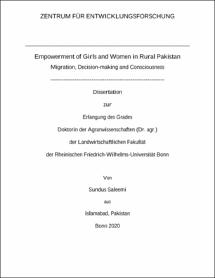Saleemi, Sundus: Empowerment of Girls and Women in Rural Pakistan : Migration, Decision-making and Consciousness. - Bonn, 2020. - Dissertation, Rheinische Friedrich-Wilhelms-Universität Bonn.
Online-Ausgabe in bonndoc: https://nbn-resolving.org/urn:nbn:de:hbz:5-60461
Online-Ausgabe in bonndoc: https://nbn-resolving.org/urn:nbn:de:hbz:5-60461
@phdthesis{handle:20.500.11811/8811,
urn: https://nbn-resolving.org/urn:nbn:de:hbz:5-60461,
author = {{Sundus Saleemi}},
title = {Empowerment of Girls and Women in Rural Pakistan : Migration, Decision-making and Consciousness},
school = {Rheinische Friedrich-Wilhelms-Universität Bonn},
year = 2020,
month = nov,
note = {This thesis analyses the effect of migration of men on women and children left behind in rural households in Pakistan. Part one analyses the impact on left-behind women’s participation in household decisions and number of hours of work. In part two, the effect on children’s work, children’s education expenditures and on gender differentials in expenditures are analysed. In the last part, it is tested if participation of women in household decisions and women’s consciousness of gender equality, reduce gender differentials in households’ education expenditures. Analysis is based on longitudinal data of rural households in Pakistan (Pakistan Rural Household Panel Survey, IFPRI & IDS, 2012; 2014). Additional data from a sub-sample of the panel collected by the author in the year 2017 has been appended to the panel. Results of the analyses suggest that men’s migration and remittances affect women’s participation in household decisions differently in extended family and nuclear family households. Women are more likely to participate in household’s expenditure decisions if they receive remittances. However, left-behind wives’ participation in households expenditure decisions increases due to remittances only in nuclear households. For agricultural production decisions, left-behind wives in nuclear family households are more likely, while those in extended family households are less likely to participate if they do not receive remittances. Migration of men reduces women’s time spent in households’ own enterprise-related and domestic work. Remittances lower hours spent by recipient women in paid and domestic work. However, left-behind wives in extended family households who do not receive remittances, spend more hours in domestic work. Migrant households do not have significantly higher expenditures on children’s education than non-migrant households. However, remittances increase households’ education expenditures. Independent of remittances, migrant households have higher share of education expenditures spent on education of girls. Girls are also more likely to be sent to school and receive higher education expenditures in migrant households. The analysis also suggests that households where women participate in decisions regarding children’s education have higher shares of expenditures spent on education of girls in the secondary school age group. Households where women participate in education decisions and exhibit consciousness towards gender equality in education, girl children are more likely to attend school. The results also suggest that households where women participate in decisions spend more on the education of girl children.},
url = {https://hdl.handle.net/20.500.11811/8811}
}
urn: https://nbn-resolving.org/urn:nbn:de:hbz:5-60461,
author = {{Sundus Saleemi}},
title = {Empowerment of Girls and Women in Rural Pakistan : Migration, Decision-making and Consciousness},
school = {Rheinische Friedrich-Wilhelms-Universität Bonn},
year = 2020,
month = nov,
note = {This thesis analyses the effect of migration of men on women and children left behind in rural households in Pakistan. Part one analyses the impact on left-behind women’s participation in household decisions and number of hours of work. In part two, the effect on children’s work, children’s education expenditures and on gender differentials in expenditures are analysed. In the last part, it is tested if participation of women in household decisions and women’s consciousness of gender equality, reduce gender differentials in households’ education expenditures. Analysis is based on longitudinal data of rural households in Pakistan (Pakistan Rural Household Panel Survey, IFPRI & IDS, 2012; 2014). Additional data from a sub-sample of the panel collected by the author in the year 2017 has been appended to the panel. Results of the analyses suggest that men’s migration and remittances affect women’s participation in household decisions differently in extended family and nuclear family households. Women are more likely to participate in household’s expenditure decisions if they receive remittances. However, left-behind wives’ participation in households expenditure decisions increases due to remittances only in nuclear households. For agricultural production decisions, left-behind wives in nuclear family households are more likely, while those in extended family households are less likely to participate if they do not receive remittances. Migration of men reduces women’s time spent in households’ own enterprise-related and domestic work. Remittances lower hours spent by recipient women in paid and domestic work. However, left-behind wives in extended family households who do not receive remittances, spend more hours in domestic work. Migrant households do not have significantly higher expenditures on children’s education than non-migrant households. However, remittances increase households’ education expenditures. Independent of remittances, migrant households have higher share of education expenditures spent on education of girls. Girls are also more likely to be sent to school and receive higher education expenditures in migrant households. The analysis also suggests that households where women participate in decisions regarding children’s education have higher shares of expenditures spent on education of girls in the secondary school age group. Households where women participate in education decisions and exhibit consciousness towards gender equality in education, girl children are more likely to attend school. The results also suggest that households where women participate in decisions spend more on the education of girl children.},
url = {https://hdl.handle.net/20.500.11811/8811}
}






